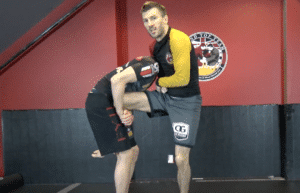
If you’ve mostly been grappling with the gi on then transitioning to no gi submission grappling can be difficult. In fact many people find the process super frustrating and end up walking away in disgust.
It DOESN’T need to be that way!! Here are 5 tips that will make the transition to no gi much easier…
Table of Contents
The 5 Tips in Video and Podcast Form
Here’s a video from my youtube channel with a lot of different teaching footage that gives you 5 of my best tips for getting better at no gi quick…
If you also like your information in podcast form then check out my podcast – The Strenuous Life Podcast– where I discuss this very topic in episode 203.
Here are the links to the podcast in various platforms…

- Apple Podcasts (the purple app on your iPhone)
- Google Podcasts (the new google podcast app)
- Spotify (it’s free)
- Stitcher,
- Soundcloud,
- Google Play
And here’s the audio of that episode in a format that you can stream right here on the site…
Speed Up Your Game
The first thing to do is to accept that No Gi is an inherently faster style of grappling and that you’ll occasionally need to push the pace harder at times.
If you’re used to doing traditional BJJ with the gi then you’ll probably be used to a slower pace. With the gi a grappling match is often like a game of chess in which you have the time to think 3 moves ahead and play out the various counters, and counters to the counter, in your head.
With less controls no gi tends to be a faster paced game. Probably faster than you’re used to.
Action, reaction, counterreaction will happen boom, boom, boom.
It’ll take a little bit of time on the mats to get used to this, but yes, you can definitely rewire your slower gi-based game to function in the faster world of no gi grappling!
Throw Out Your Grips
Change your grips so that they aren’t gi dependent.
In the gi there are tons of sleeve, lapel, collar and belt grips that just don’t exist in no gi.
Without the gi you’ll have to rely much more on wrestling-based controls like wrist grips, collar ties, underhooks, overhooks, two-on-ones, and bearhugs.
Because everything is slipperier you may not be able to maintain your grips for as long, so you’ve got to be prepared to transition from grip to grip to grip. And once you get a dominant grip you should exploit it immediately!
Again, this is a process, but it’s totally possible.
The video below gives you an idea of how sophisticated you can get in no gi gripfighting…
Throw Out Your Guards
The next thing to do is to get rid of your gi dependent guards and start focussing on guards that also work in no gi.
In classical BJJ there are some very effective guards that really only work with the gi.
The closed guard with the sleeve and collar grip, the spider guard, and the de la Riva guard with the sleeve grip are three good examples of gi-dependent guards.
In no gi you just don’t have these grips so you need to throw these guards out or heavily adapt them.
Common no gi guards include the butterfly guard, half guard, half butterfly and closed guard with overhooks and underhooks.
Sometimes classic guards can be adapted to the no gi environment. One example of this is the no gi de la Riva Guard, which doesn’t rely on gripping cloth to create control.
The Back is Supreme
Next it’s critical to learn how to take the back, maintain the back and submit from the back because it’s the best position in no gi grappling.
Getting behind someone, putting your hooks in, and establishing rear mount is always a good thing in grappling. But it becomes even more important in no gi grappling!
Once you’ve established this incredibly dominant position it becomes much harder for your opponent to spin, wriggle, or squirm his way out.
And it also sets you up to attack with the rear naked choke, one of the most dominant chokes in no gi grappling!
Guillotine Chokes and Leglocks
You’ve absolutely got to develop your leglock and guillotine choke submissions because those are much more prevalent in no gi than in gi.
In no gi grappling you obviously lose all your lapel chokes, but it’s also harder to land straight armlocks as well because of the sweat and lack of control.
Now most no gi grappling rule sets are more liberal when it comes to leglocking (i.e. many of them allow leg reaping and heel hooks), which definitely opens up new opportunities for you.
This means that if you want to do no gi you should get really good at guillotine chokes and leglocks.
Here are a couple of resources to help you with that…
I’ve created a free PDF that breaks down the most common and most important positions in modern leglocking…
Click here to download this 15 page PDF completely for free!
Secondly, check out my article called ‘The Ultimate Guide to the Guillotine Choke‘. It’ll have you jumping on your opponents’ necks and choking them out in no time!
More Resources and Articles…
If you’d like some more help developing your gi and no gi games then here are a couple of other resources for you…
Grab my free Grapplearts BJJ Master App for iOS and Android devices that comes with more than 457 minutes of technique taught by BJJ black belts. Click here for more info.
The Modern Leglock Formula featuring Rob Biernacki and Stephan Kesting (that would be *ahem* yours truly) is your systematic and scientific guide to leglocks. It’ll add an entire new dimension to your grappling! Click here for more information.
Click here to download a free copy of my book, A Roadmap to BJJ, which will take you through the most important positions and transitions on the ground.
Good luck with your training
Stephan Kesting
Grapplearts.com






